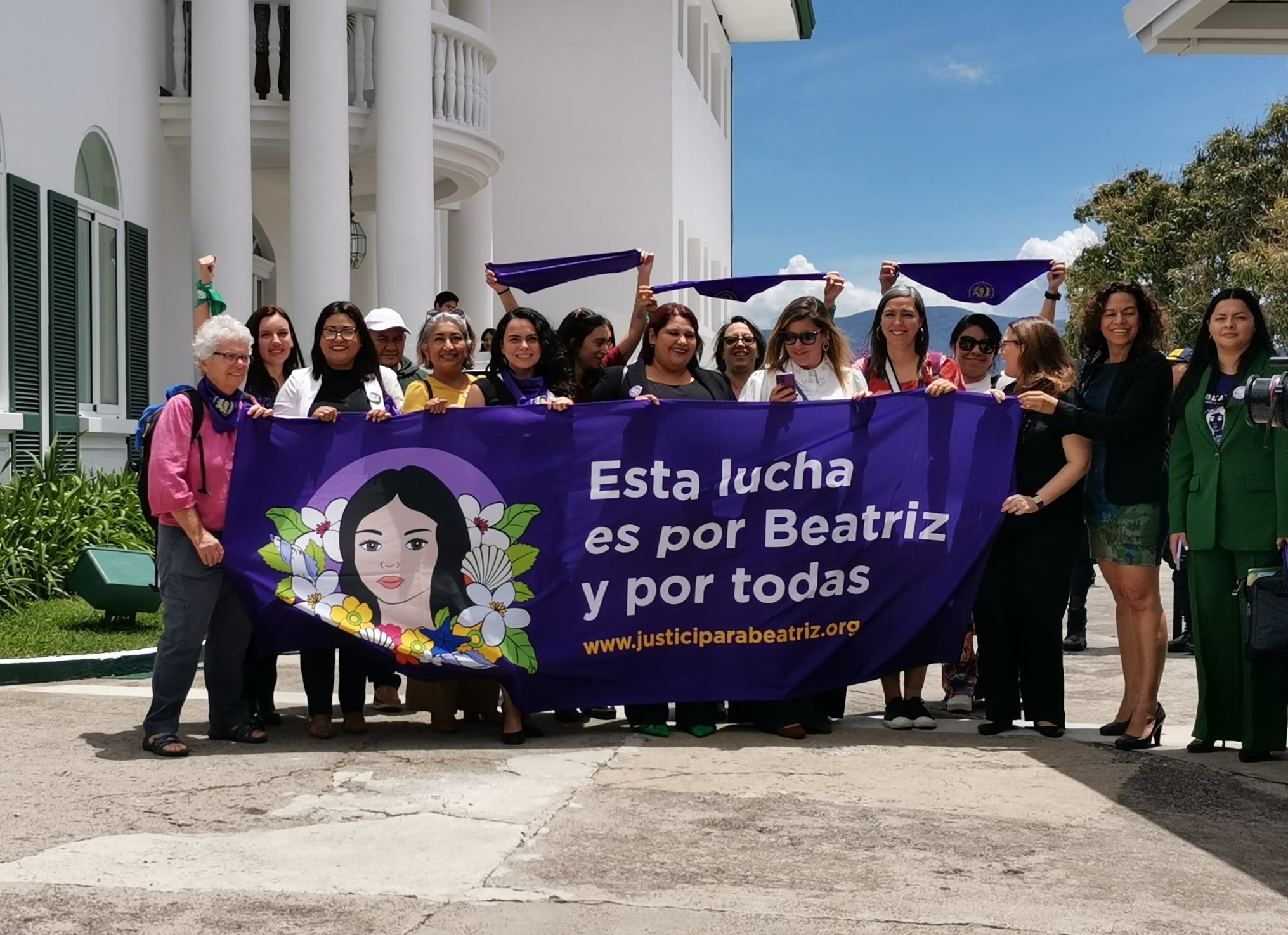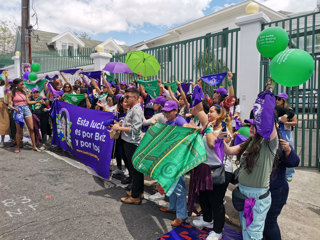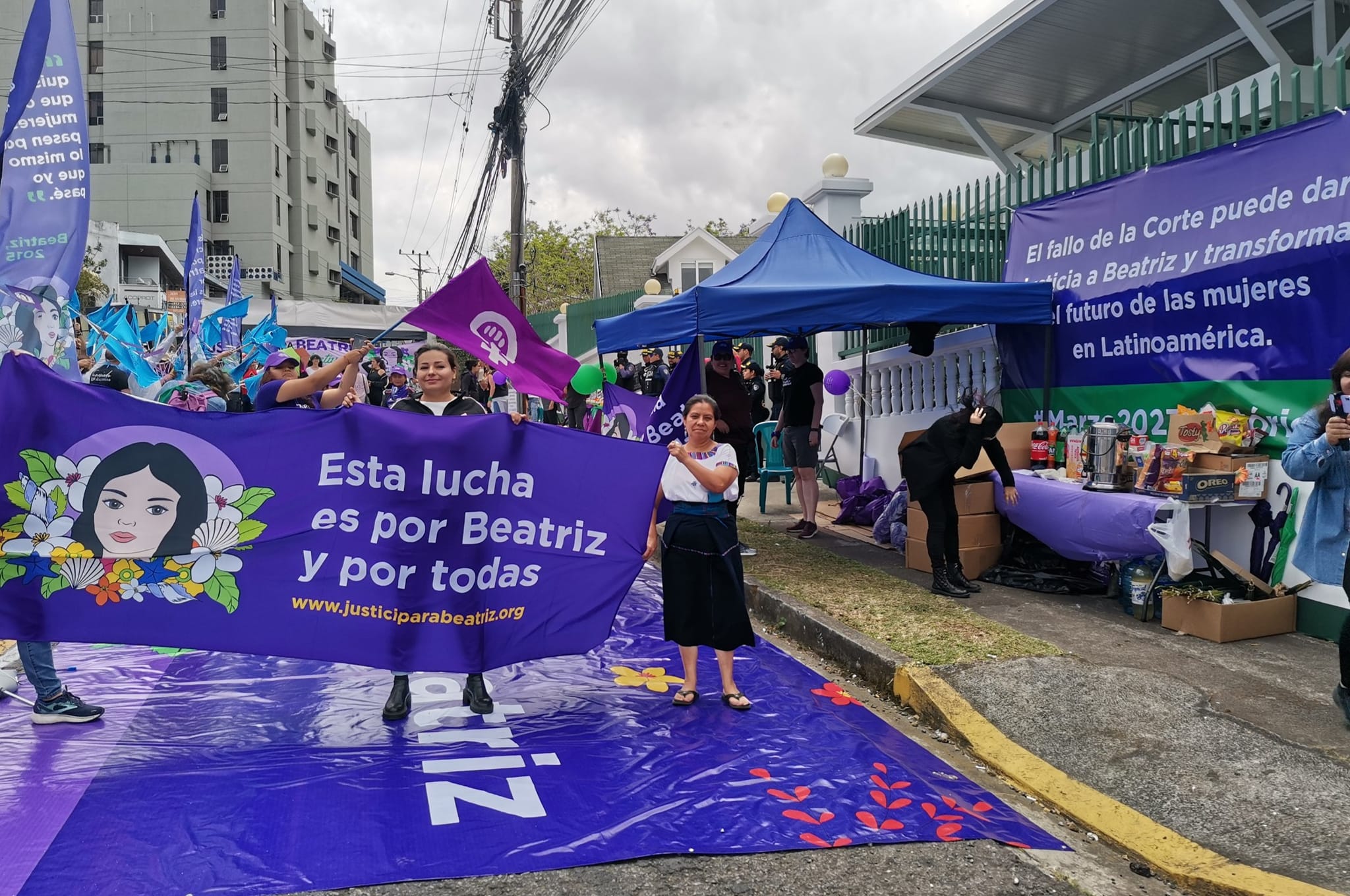The Inter-American Court of Human Rights analyzes the case of Beatriz, a young woman who was denied the possibility of terminating her pregnancy by the State of El Salvador because her life was at risk.
By Carmen Rodríguez

The Inter-American Court of Human Rights (IACHR) has had in its hands since last March the case of Beatriz, a young woman to whom the State of El Salvador denied, in 2013, the interruption of her pregnancy. Doctors indicated at the time that the pregnancy was unsustainable, that the mother’s life was in danger and that the baby was encephalic.
As detailed by the Spanish newspaper El País, Beatriz’s mother said during the initial hearing at the IACHR that her daughter was diagnosed with lupus when she was pregnant with her first child in 2011. Beatriz did not only have lupus. During her second pregnancy she was diagnosed with kidney damage and arthritis. Doctors could not terminate the pregnancy despite the risk it posed to the young woman. But there was something else: the baby was gestated without a skull, without a brain and with a congenital malformation.
In May, when Beatriz was ten weeks pregnant, the Salvadoran Supreme Court (CJS) rejected the request for the termination of the pregnancy that the young woman had made weeks earlier, arguing that “the rights of the mother do not prevail” over the rights of the child. The magistrates of the Salvadoran Court denied the request because, according to the resolution, the doctors had to use all the tools at their disposal to guarantee the protection of the baby’s life. They also argued that the danger posed by the health situation of the young woman, complicated by the pregnancy, was not imminent, but it would be in the future.
The IACHR intervened and urged the Salvadoran State to allow the termination of the pregnancy.
The CJS agreed and allowed the young woman to undergo a cesarean section, 81 days after receiving the request. The baby died after five hours. According to the Feminist Collective of El Salvador, as a result of this intervention, which was “a more invasive operation than initially required,” Beatriz’s health deteriorated. Four years later, in 2017, the young woman upon failing to recover from a traffic accident.
Her family and the feminist organizations that accompanied the case took the complaint to the IACHR in search of justice and to avoid, as the young woman’s mother said, that other women suffer what her daughter suffered. In an official document on Beatriz’s case, the IACHR stated that the request for international responsibility of the Salvadoran State is based on the fact that “multiple factors converged in the vulnerability and risk of discrimination associated with Beatriz’s condition as a young woman and a person living in poverty”. Currently, Beatriz’s family, her lawyers and the Salvadoran State’s representation are waiting for the sentence to be issued.
Punitive law
In 2021, the Office of the United Nations High Commissioner for Human Rights pointed out that, for more than 20 years, El Salvador has had one of the “most restrictive abortion laws in the world” and that most of the women prosecuted for this crime come from low-income sectors. El Salvador is one of the four countries in Central America and the Caribbean with the harshest penalties for women accused of abortion. It is also the only one of the four Central American countries that criminalizes women prosecuted for abortion with sentences of up to 50 years in prison for homicide. According to this Office, “the absolute prohibition of abortion violates the human rights of women and girls.

The trial in Beatriz’s case has highlighted the consequences and impact on the lives of Salvadoran women and low-income families of an anti-abortion law that heavily punishes even a spontaneous abortion. According to feminist organizations, this punitive law “has given rise to a systematic practice of discrimination against women who suffer obstetric emergencies or pregnancy loss due to complications, which constitutes cruel and inhumane treatment”.
Beatriz’s family’s complaint to the IACHR represents hope for feminist organizations and progressive women in the Central American country, but the outlook in the socio-political context in which the country lives is not equally hopeful. At the political level, abortion continues to be an issue in which there is no room for open discussion or tolerance. A few days after the IACHR began the hearing in the Beatriz case, Salvadoran President Nayib Bukele radically changed the open stance on the abortion issue that he showed during the election campaign.
These changes in the president’s positions have been notorious in the issue of gender policy, or the inclusion of LGBTQ+ rights, but regarding abortion, Bukele went from accepting its possibility when the mother’s life is in danger, to an ultra-conservative position that condemns and qualifies abortion as a crime.
Beatriz’s case at the IACHR
With the complaint before the IACHR, Beatriz’s family and the Feminist Collective hope that the Salvadoran State will recognize that it violated the human rights of the young woman and that there is a direct social and economic impact on the family. They also demand that the Salvadoran State recognize that a change in reproductive health policies is needed in the country.
The IACHR held the first hearing between March 22 and 23 and on April 10 the deadline for both parties, the plaintiff and the defendant, to present their evidence and witnesses.
Morena Herrera, a referent and activist in the fight for women’s rights, explained to Mira: Feminisms and Democracies that the litigants and women’s organizations are analyzing the testimonies and evidence, which were presented at the Inter-American Court. Herrera believes that the hearing revealed the real situation on the issue of abortion in El Salvador. In her testimony, the doctor explained in detail the risk to the health of the mother and the condition of the fetus.
“The government issued a communiqué, which does not say much but states that it does not change the legislation, it is not a particularly belligerent communiqué and we are glad it is so. But what was reflected in the hearing is that there is an alliance between the government and conservative sectors,” said Herrera. Even if the IACHR rules in favor of Beatriz and her family, El Salvador is not obligated to change legislation regarding convictions against women who are accused of having an abortion.
Herrera pointed out that there is a campaign orchestrated by an organization of the Christian right called “Global Center for Human Rights” that aims to attack and discredit the statements that have been made about Beatriz’s case, and downplay the importance of the testimonies of the mother of the young woman and the doctor who treated her, to deny the merits of the lawsuit. Herrera believes that the hearing revealed the real situation on the issue of abortion in El Salvador. In their testimony, the doctor explained in detail the risk to the health of the mother and the condition of the fetus.
“The government issued a communiqué, which does not say much but states that it does not change the legislation, it is not a particularly belligerent communiqué and we are glad it is so. But what was reflected in the hearing is that there is an alliance between the government and conservative sectors,” said Herrera. Even if the IACHR rules in favor of Beatriz and her family, El Salvador is not obligated to change legislation regarding convictions against women who are accused of having an abortion.
Herrera pointed out that there is a campaign orchestrated by an organization of the Christian right called “Global Center for Human Rights” that aims to attack and discredit the statements that have been made about Beatriz’s case, and downplay the importance of the testimonies of the mother of the young woman and the doctor who treated her, to deny the merits of the lawsuit.
Organizations are analyzing the testimonies and evidence, which were presented at the Inter-American Court. Herrera pointed out that among the organizations accompanying the lawsuit, it is perceived that in this process there are more elements in favor of Beatriz, than in favor of the Salvadoran State. However, it is not clear when the IACHR will be able to issue a resolution. “They are also distorting what the representative organizations are saying and attacking the Inter-American Court, advancing criteria. This worries us because it threatens the Inter-American human rights system,” said Herrera.
Salvadoran feminist organizations consider that these actions are linked to Salvadoran ultra-conservative groups that have direct connections with anti-abortion organizations in the United States, which handle the concept “we do not want a next Roe”, referring to the Roe v. Wade case.

“As long as Nuevas Ideas (the ruling party) has a majority in the Legislative Assembly, there is not the slightest possibility that abortion will be legalized in El Salvador. We defend life above all things. We will respect what the Constitution says, not what some organizations want to impose from abroad”.
Thus, the president of the Legislative Assembly, Ernesto Castro, a man Bukele trusts, expressed himself a few hours after the hearing of the Beatriz case at the IACHR. As usual, the pro-government deputies replied to the message, followed by other very similar comments from the rest of the pro-government bench and its deputies. A common narrative is to attribute the defense of reproductive and sexual rights to external groups. “No international resolution can surpass. No matter how much the international agendas want it, in El Salvador it is NOT legal”, wrote in social networks the congresswoman Marcela Pineda.
The Manuela Case
Beatriz’s case is not the only case that has challenged the Salvadoran government’s anti-abortion policy at the Inter-American Court. In 2021, the same Court condemned the Salvadoran State for the criminalization of Manuela, a woman who sought health care in the midst of an obstetric emergency in 2008. The medical report concluded that Manuela suffered severe postpartum preeclampsia, which was complicated by anemia. Manuela suffered an out-of-hospital delivery.
But the attending physician reported Manuela’s admission to the authorities as a suspected miscarriage. The same year the incident occurred, Manuela was sentenced to 30 years in prison for aggravated homicide. Manuela died of cancer in prison while serving the 30-year prison sentence she was condemned to.
After hearing the case, the IACHR ruled in favor of Manuela and required public recognition of the violation of her rights by the government of El Salvador and reparations for the damages to her children. The State has shown willingness to comply with the reparation of damages, but has not publicly acknowledged the violation of Manuela’s rights nor does it plan to comply with the IACHR’s recommendation to include comprehensive sexuality education in Salvadoran schools.
“Last year there was a reaction from conservative groups because of a video that the Teacher Training Institute was broadcasting in this regard. This showed us that the government is very susceptible to complaints and pressure from conservative groups. A group of Catholic parents pressured and the government quickly withdrew all sexuality education material from the entire educational system,” said Herrera.
The hardening of the position of Bukele and his party, pushed by international ultra-right groups, shows that the abortion issue is receding in El Salvador.
Photos courtesy of Colectiva Feminista El Salvador
Carmen Rodríguez is a journalist and news correspondent in the U.S. for Latin America with 13 years of experience in multimedia journalism, communications and news content production. Specializes in U.S. Foreign Policy with a focus on Central America and Migration.



